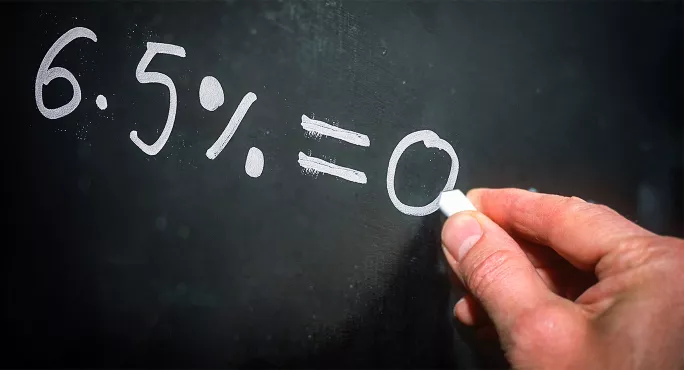Teacher pay: 6.5% rise ‘unlikely’ to make ‘significant difference’

Experts have warned that offering a 6.5 per cent pay rise for teachers alone is “unlikely” to make a “significant difference” in improving teacher supply.
A new report has urged all UK political parties to set out their plans for tackling teacher recruitment and retention challenges in their 2024 general election manifestoes.
In a new report published today, the National Foundation for Educational Research (NFER) suggested that while a rise of 6.5 per cent is likely to have a more positive impact on supply compared to the pay proposals put forward by the Department for Education earlier this year, the rise is “unlikely to make a highly significant difference to the overall supply picture on its own”.
The warnings come after reports that the independent School Teachers’ Review Body, which makes recommendations on teacher pay, had advised that teachers should receive a 6.5 per cent pay increase for 2023-24.
- Unions: Sunak warned 6.5% pay rise for teachers is ‘bare minimum’
- NEU: Teachers to strike for two further days next month
- Teacher strikes: Unions urge new pay talks after 6.5% leak
Last week, a teaching union leader said the government could bring an end to the ongoing teacher strikes if it met and funded a 6.5 per cent pay rise for teachers.
In its report today, the NFER calls for “a wider strategy for improving recruitment and retention that is based on a long-term plan to continue to improve the competitiveness of teacher pay and/or financial incentives, action to improve the non-financial attractiveness of teaching, or a combination of both”.
The NFER suggested that a “full correction” to teacher pay would mean a rise of 16.5 per cent in 2024-25 for all pay points, with a return to 2 per cent per year from 2025-26 onwards.
And the report states that while such a scenario “may seem an extreme one to consider”, it is “similar to the approach taken by the incoming Labour government after the 1974 general election”.
Under the “full correction” scenario, the NFER forecasts an increase in the recruitment and retention of shortage subjects, such as maths, computing and all sciences, leading to these subjects each meeting their targets in 2027-28.
Last year, the DfE missed its target for secondary teacher trainee entrants by 41 per cent, with just 12,356 entrants.
The subjects hit with the worst shortfalls were physics, which saw less than one-fifth of the targeted number of trainees recruited to courses this year (17 per cent); design and technology, which only managed a quarter of the required trainees (25 per cent); and computing, which attracted less than one-third of the trainees needed (30 per cent).
Calls to ‘redesign’ levelling up premium
The NFER’s report also calls for the government to “redesign” the levelling up premium early career payments.
It claims the government should widen eligibility “to all schools nationally and increasing payment generosity to enhance its impact”.
Commenting on the NFER analysis, Geoff Barton, general secretary of the Association of School and College Leaders, said: “Teacher recruitment and retention problems are now so serious that this is something akin to an existential crisis.
“Schools and colleges are struggling to put qualified teachers in front of classes and it is only a matter of time before they are not able to do so any longer.”
Paul Whiteman, general secretary of the NAHT school leaders’ union, said that a significant pay rise would be “absolutely crucial in tackling the crippling recruitment and retention problems gripping schools following years of real-terms pay cuts”.
Labour has announced a series of policy plans, including a new retention payment when teachers complete the two-year Early Career Framework.
The party says this plan will recognise the professional development teachers have undertaken. Labour believes it will cost around £56 million and can be funded from money raised by ending private schools’ VAT tax exemption.
A DfE spokesperson said: ”There are now 27,000 more teachers in our schools than in 2010 - a rise of six per cent. This makes it the highest number of full-time teachers on record since the School Workforce Census began in 2010.
“The department offers a range recruitment and retention initiatives to attract the best candidates into teaching. This includes bursaries worth £27,000 tax-free and scholarships worth £29,000 tax-free, which encourage talented trainees to teach key STEM subjects such as mathematics, physics, chemistry and computing.
“On top of this, the Levelling Up Premium worth up to £3,000 tax-free annually is available for maths, physics, chemistry and computing teachers who choose to work in disadvantaged schools in the first five years of their careers. This is helping to support the recruitment and retention of specialist teachers in schools and areas that need them most.”
You need a Tes subscription to read this article
Subscribe now to read this article and get other subscriber-only content:
- Unlimited access to all Tes magazine content
- Exclusive subscriber-only stories
- Award-winning email newsletters
Already a subscriber? Log in
You need a subscription to read this article
Subscribe now to read this article and get other subscriber-only content, including:
- Unlimited access to all Tes magazine content
- Exclusive subscriber-only stories
- Award-winning email newsletters
topics in this article



